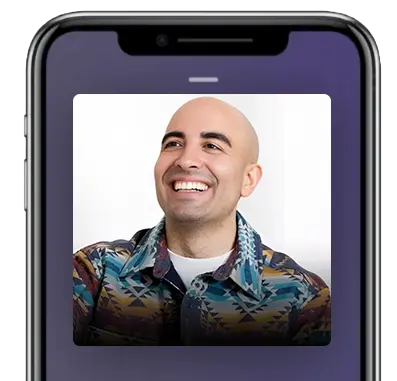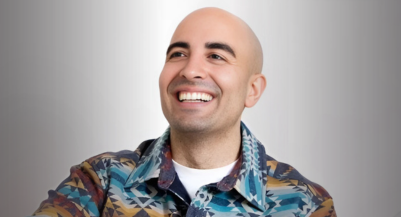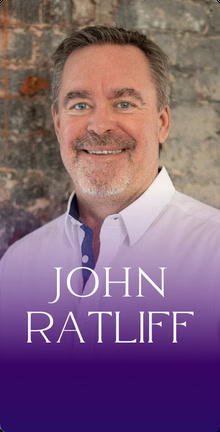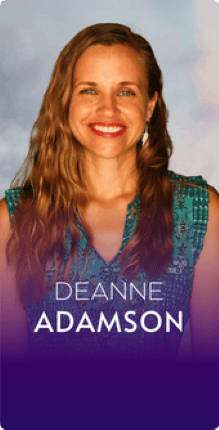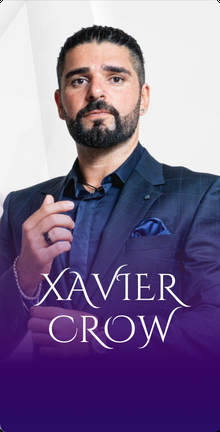In this Episode
- [02:21]Stephan introduces Amrit Sandhu, highlighting his background in spirituality and his podcast “Inspired Evolution.”
- [06:39]Amrit recounts his origin story, including his struggles with major clinical depression and his journey to self-awareness.
- [16:55]Amrit discusses the link between anxiety and depression, and how mindfulness and meditation helped him rebuild his internal self.
- [22:03]Amrit and Stephan on consciousness and the power of presence.
- [34:21]Stephan highlights the role of gratitude and presence in overcoming depression and anxiety.
- [40:24]Amrit explains how conflict creates space for shadow work.
- [43:12]Amrit introduces his meta flow formula for discovering one’s sacred curiosities and aligning them with core values.
- [51:23]Amrit describes the grassroots approach of interviewing friends and local community members before attracting big names.
- [55:02]Amrit provides resources for listeners to learn more about themselves and their values.
Amrit, it’s so great to have you on the show.
Oh my God, Stephan, thank you so much for having me. It’s such a pleasure to be here. The guests that you’ve had on your podcast, I feel a little bit of imposter syndrome being on your show. Thank you so much for having me.
I think imposter syndrome kind of comes with the territory when you interview luminaries. So yeah, I’ve had it too. It’s just part of life, I think. In fact, I’m curious what kind of story comes to your mind when I ask you about imposter syndrome. I’ve got a fun story, but I want to ask for yours first.
I feel like it’s happening all the time. Like we’ve been running a podcast for about eight and a half, going on almost nine years, I think. I don’t think there are many days where it’s just like, I look around at the incredible sort of feedback that’s given, touchwood, through the work that we’re doing. I’m sort of like, “Oh yeah.” I sometimes find myself having, I don’t know if this is normal for you, I’ve got a healthy sense of cognitive dissonance from what the podcast is actually doing in and around the world.
Recently, I got certified as an astrologer, and there was another lady who was actually going through the process with me. And we’re being adjudicated at the same time for our certification, as we were giving some readings, she turned around and she said, “I just wanted you to know that actually I’m here because of you.” I was like “What?” Like she had an old background, lawyer, legal, all this stuff, and she was like, “Yeah, I’m pivoting to this because of you.” I was like “What?” And she goes, “Yeah, I listened to your podcast.”
And it was like a little bit of a cascading moment for me, where a few things sort of collapsed in on themselves, and I was like, “Oh yeah, that’s right. People do listen to the podcast.”
Your shadow is an opportunity to rise up into your gift. Don't avoid it - the more you avoid it, the more it keeps rearing its head. Share on X
Obviously, you see the numbers in the back in the podcast and people tuning in, but there’s something about the human connection when someone says, “So I’m going to actually listen to this podcast, and actually it’s influenced me to change the entire trajectory of my life.” You think about that person, family, potential, their passions and how much more joyous they are to be and how that ripples into all the corners of their life. Then you look at the numbers on the podcast and go, “Wow, there’s probably some really cool things that are happening in the world.”
Following the things I’m passionate about, humbly, I think there’s a healthy sense of cognitive dissonance there. But I feel like the imposter syndrome is present pretty much all the time. Hence the cognitive dissonance, because at the end of the day, these conversations that we’re having still very much feel like touchwood and especially in the early days of the podcast coming out, like there weren’t that many people listening to it. I was just having a great time enjoying the podcast, having a jam.
In conversation with people, I would continue to do that. Just cause of how life-enriching these conversations can be for an individual to have with others. And the fact that they’re actually supporting others is incredible. Touchwood.
How was that imposter syndrome? Because it sounds like it was just reaffirming that you were on the path
It is, but it also sometimes happens when you feel into someone, going that actually completely changed my life. It’s like, really? It was just a conversation that I was having with someone. I didn’t realize it was going to do that for you. And then they’re heaping all this praise onto you in terms of like, no, no, that was you. And you unlocked that for me, you’re like, “Really? That was me.” Like they did that, you don’t feel quite adequately like, “Oh yes, I do have this podcast, and I’m glad it changed your life.” Hence, stepping into that distance.

Years ago, I wrote an article about imposter syndrome for the Huffington Post. Because of that, Psychology Today contacted me and asked me to be one of the features in the story about imposter syndrome. And I agreed. It got to the point where they wanted me to be on the cover of that issue. I freaked out. I talked to my wife about it.
She said, “Well, you’re gonna be the poster boy for imposter syndrome, seriously?” And I thought about that again, and yeah. I passed on the opportunity.
I love it. You can’t write stuff like that. That’s so cool. Thank you for sharing that story.
So let’s talk a bit about your origin story, your superhero origin story. How did you end up where you’re at? Before we started the recording, you were talking about how you pivoted your podcast from just general personal development to a more spirituality-focused one. I’m sure there’s a story behind that, but I want to hear the story behind the story and hear how you got into this whole life path in the first place.
We can go back probably, and maybe I’m a bit too spiritual, but all of our paths are leading us moment to moment, stuck to where we are now. Each moment was perfectly orchestrated, right? But where we are right now, the big sort of, when I look back to two real big challenges I had in my life, that really stand out in terms of origin story were coming out of high school, the early days of university.
There was this massive, like a lot of my life, sort of crumbled all around me. Friends, relationships, and my academia aren’t just stuff. I ended up basically square in front of a psychologist, and I was sitting there for a young man of about 22 to be sitting opposite a psychologist.
If you can understand your values, you can check back in and see if what you're curious about is built upon your values. This is how you distinguish sacred curiosities from hijacked ones. Share on X
You’re pretty invincible at 22. You’re pretty bulletproof, psychologically. Anyway, you think exactly as we think. Something really must be going wrong, right? For me to end up in that situation. I remember sitting opposite her, going through, and she was like, “Yep, you’ve been struggling with what is diagnosed as major clinical depression for the last six years.” She prescribed me a bunch of pills in her wisdom. A couple of things she said, actually, at the time, which really stood out. But one of the key things was you’re going to be all right. It was really weird because I’d never liked it. Now mental health is more of a conversation, but back then, this is like, 15 years ago, it wasn’t really that big a conversation that people were having.
And it was weird because if you broke a bone, you break a bone in an instant, and then it takes you three months to recover from it. So here she was, “You’ve been struggling with this for six years, but you’ll be right in a couple of months.” The logic was kind of flipped on its head. It was like that, just sort of doesn’t make sense, because I was basing it on the external physical rather than the internal landscape. Her commentary was, you’re to be okay because A, you know, something’s wrong, and B, you’re here trying to do something about it. At the time, I just glossed past those points, and I was like, “Yep, sure, whatever, moving on.” In hindsight, having become a coach, guide, mentor, I realized how actually important those two things are: to know that something’s wrong or there’s something you’d like to shift.
And B, that you genuinely want to do something about? That was actually quite wise what she said. Given that she then also described, actually, you need to adopt the value of honesty. And you need to start to learn to be honest with yourself. That was quite profound because she’d almost pulled the exact thread that was at the core of the entire tapestry that I had built my life upon, which was causing everything to fall apart. There are a bunch of reasons for that. Growing up in an immigrant family here in a Western environment, there was a very mismatch of cultural values. Australia is a very different place from India.
Being raised with Indian values and then trying to assimilate into Western values, you’re trying to find your way, but you can’t always do it. So you end up fudging the lines in between sometimes. That’s like a nervous system tension that you end up carrying. I’m much more eloquent about it now, but like back then, it was just like an existential crisis.

She said, “If you can adopt honesty and be honest with yourself about where you’re at, who you are and all this.” That started to really unravel me. But that was the first point that the podcast inspired. Evolution all came a lot later, but that was the first point where we talked about a growth mindset, right? I followed your podcast for a little bit. I can see that I realize it wasn’t etched in stone. We were malleable beings. She was like, “Can you install honesty, like you can install a value?” I was like, “Ah, I can shift on the inside.” With that, she prescribed me pills. I remember taking my first pill; it was amazing. I went on an Incredible high, and the high was just surfacing back out from beneath the ocean of depression, and kind of going, “This is what it’s like above the surface.”
Then four and a half hours later, I was back in the water, touchwood. I could realize that I was just completely ducking and weaving and ducking and weaving. I was like, “I’m not sure this is the life I want to live.” I remember even at that young age, sort of picking up the box and sort of putting it in the bin, a massive disclaimer at this point in the conversation of the origin story. There are people who have intense chemical imbalances in their minds. And absolutely, I’m not popping medication. It really is a very supportive tool. I’ve got clients who have been through it and need the medication to support them through a period of their life. But they did a study in 2023, and now it’s 2025, and they projected in 2025 that one in two people would be walking around anxious or depressed across the planet. One in two. I just find it a little bit difficult to swallow the medicine that every like 50 % of the population needs to be medicated.
To navigate their way through reality. Something’s just not driving there. Maybe the way society struck up and all this, we can have more of a chat about it in the pod. But that was my moment, and I threw the pills in. And by some grace of God, I literally think my doctor was an angel because she was prescribing to a psychiatrist, but the doctor that I saw who prescribed me to the psychiatrist was this Thai lady, and she gave me this breathing exercise.
I remember when she gave me the breathing exercise; it was like breathing, ‘Come on, you’re 22, someone’s telling you to breathe.’ And you’re just like, “I didn’t rock up a zombie. I’m breathing. Of course I’m breathing.” Anyway, she wrote down the breathing exercise and gave it to me. She’s like, “Look, I’ve done a lot of mental health work myself in the past, and this can be very supportive.”And I’m like, “Sure. Okay. Whatever.” I was very dismissive of it, to put it politely.
There’s nothing wrong with looking back. There’s nothing wrong with looking forward. In fact, the human species has gotten to where it’s gotten to because of its ability to learn from its mistakes.
Then went on my merry way, and there was a clear moment in time where I felt very anxious. We can talk about how anxiety and depression are so linked, right? Anxiety, one of the people I was fortunate enough to be coached by for six months of coaching to become a coach for Eckhart Tolle in his school of awakening. Anxiety is like where you live too much in the future. It’s like you’re trying to “Hey, I wonder how that’s going to go.” You’re worrying about what’s upcoming. Depression is like, you’re stuck in the past somewhere that should have happened that way.
And it’s depressing because he’s worried about what happened, and there’s nothing you can do to change it. Again, with the work of Eckhart Tolle, right? The present moment is this real gift where you can anchor yourself. Now there’s nothing wrong with looking back. There’s nothing wrong with looking forward. In fact, the human species has gotten to where it’s gotten to because of its ability to learn from its mistakes. Hopefully, it’s an interesting time that we’re in the world at the moment, but nonetheless, we should learn from its mistakes and forecast where it’s headed.
But it’s when we spend too much time in either state and are not anchored in the present. It’s like, “Hey, I’m right here right now speaking to Stephan on the other side of the planet. Really fortunate touchwood. There’s a roof over my head. I’ve got enough money to be able to afford a camera to have this conversation. He’s got the same. We’re actually two very abundant people.” Touchwood is a lot to be grateful for in this present moment, a really beautiful connection. So being anchored in the present moment is a real gift. That’s where anxiety and depression are so linked together, because the challenge actually is presence.
I felt this deep sense of anxiety in the present moment when I was going through a moment in time after the diagnosis. And by some grace of God, the lady’s breath work was on the back of my phone screen cover at the time, I had a clear cover, and I started breathing my way through the moment. There was life before, in life after that moment. Basically, it was just with every breath, the anxiety had the walls closing in on me, and with every breath.
I was able to move the walls out in one out of two, in three out of four. And just with that, and I was like, “What is this creating all this space?” That got me hooked. I learned a little bit about growth and values and how we’re malleable. Then I learned inadvertently, I didn’t know this was mindfulness at the time I learned this breathing exercise.
Then the curiosity started to become mindfulness meditation, and I started getting into meditation. From there, my life started to do a full 180. I started to rebuild my internal self with meditation, and the byproduct of a lot of meditation is self-awareness, touchwood. Looking at self-awareness and then understanding the values and trying to reprogram oneself to live a more integrous life, more honest with oneself, became the operative direction to dedicate oneself towards.
When you're in flow with your life and the reason you're put here, opportunities start appearing that blow your mind. Share on X
That’s how I started moving forward. Even with all that awareness. Started becoming more self-aware with all of that. Seven years later, I graduated from university. And one of the hallmarks of the things that prompted me to go seek help was that I was actually asked to leave the university.
My whole life, being an Indian kid growing up in a Western environment, was always getting A’s. For me to be asked to leave university was a pretty big deal. Because my whole identity was like, I’m academic. And all of a sudden, in an independent learning environment, I was just floundering, but I didn’t know who to turn to for help.
So you were asked to leave by what, the dean or?
No, the university itself. It was a formal letter that came home and said, “Your grades aren’t cutting it. You can’t continue pursuing this.” Which was quite harrowing because it was like all of a sudden your whole life, you’ve been academic, all your friends and everybody, your family, your parents, everybody knows you as a certain type of individual. And it’s like just the shame.
Because everyone’s thinking you’re doing great. It’s the mental health rights internal. They can’t see inside. That was one thing that led me on the journey. The opposite of the psychologist is like, as I started telling my friends, they weren’t very supportive. They were just like, “You’ve been lying to me this whole time.” So I went through this whole process.
This destroys your identity. If your identity is based on your achievements and your career or your academic position, then you don’t have anything to hold on to. You’re just something amorphous, like a free-floating, unidentified spiritual object, I guess. I don’t know.
Which is great when you’re on a spiritual path and you try to pursue that, right? When you’re not and you’re well, it is an existential crisis.

Yeah, it’s like getting the rug pulled from under you. I think a lot of people will be going through that in short order whose identities are tied to their careers. Then their career gets taken away by AI because, according to some studies and predictions, half of all jobs will be gone. Half of all employment will be gone in three years’ time.
It’s a very interesting time to be alive in this sort of crisis in meaning, as they put it. I went through that at that point, and then I re-engaged with this new improved self-awareness with university went to basically dedicate myself, finished my degree, got my degree. And one of the things that happened when I graduated with my degree the second time around, and this is going to sound egotistical for a sec. So just bear with me for a moment.
But when I graduated with the degree, I graduated top of not just structural engineering, not just top of engineering, but top of like the entire university for that year for leadership, academia and innovation. It was quite profound because they had this whole process of selecting who they were going to award this award to, because there are a lot of people who actually had a perfect GPA. A handful of people, touchwood.
And there was this interview process, and towards the end, the last question they asked me about this interview process was like, “Why should we give this award to you?” It was just one of those questions I hadn’t prepared for; all the other questions, I was like, “Yeah, tell us a little bit.” It was like, “Wow.” Cause I’ve met the other candidates and they’re all phenomenal. And you’re like, wow. Talk about imposter syndrome again, rears its head in the conversation. I was like, “Yeah, why?” It was one of those moments where I just sort of sat back and said, “Jesus, take the wheel. You know, like you tell me what.”
You know, and what came out of my mouth at the time was this. Four years ago, I was asked to leave a university because of poor academic performance and bad mental health. Poor mental health. Four years later, the same individual is graduating from university. Not just engineering, not everything I said before, but like he’s, “If you were to award me this award, it would be incumbent upon me to share the importance of the value of mental health and how important, that’s the same person, just different states of mental health.”
I don’t want to sound like this, but in that moment, I knew I had the award. Because I could see it, like it clicked for all of them. I was surprised that those were the words that came out of my mouth, but it was my truth. Hence, why, even though it sounds egotistical, I find it incumbent to share this message because it’s important.
That’s literally the same person. With that, having this award, being a decorated student, but I’ve got the best job an engineer could get. Very high paying, very well, very successful and landed on my first day in the workplace. I remember looking at my CEO, and I’m quite self-aware at this point. Because I’ve been meditating for like four years. So I’m like, daily looking at my CEO and kind of going, he doesn’t embody any of the values that I want to value.
Cause I remember where I came from, and looking at him, I’m kind of going, “Okay, maybe this is that case of that Gandhi quote.” “We will be the change we wish to see in the world and organizations, and we will change and evolve over time.” So I joined the organization and kept going, kept going, kept going. Over time, I got to this point where I realized the organization’s not changing, and I’m feeling very suffocated in it around here. That was really challenging because by everybody’s standards, I’d made it.
And this was the best job again, like anyone could have. This is your one opportunity. Make the most of it. I call it the white picket fence lane. It’s like you’re living down this, make sure you get a good job and make sure you get good grades. After you get a good job, then marry well, have good kids, buy a nice house, all that sort of stuff. Buy a nice fast car, and all this is a white picket fence lane. One of the things that’s going on out here. Don’t peek your head out. I was on the white picket fence lane.
But it was slow, it really wasn’t in alignment with who I was put here to do. That was the birthplace of the Inspired Evolution podcast after putting up with that for years and years and years and years and feeling more and more stifled and more embedded into what some people like, and there’s the matrix, but just really embedded in there, touchwood. I felt I saw individuals such as yourself, authors, coaches, speakers, entrepreneurs, social entrepreneurs, having an impact, doing things that matter to them.
They didn’t need to be super well off or whatever, but they were living a life where something that mattered to them was what they were spending their time pursuing. So I was inspired by these individuals, and I was ready to evolve. That was the birthplace of the Inspired Evolution. It always reflects back to me. Inspired Evolution sounds really beautiful as a name. I think personally, obviously, I’m biased as a podcast name, but it sounds like it’s got, but it came from this place of like I’m inspired to evolve. I was feeling so stuck.
Yeah, you know how crabs outgrow their shell, and they have to leave their shell or they will die. Then they have to find another shell to occupy, which another bigger crab, a hermit crab, had left, and they found a bigger shell. We’re all interconnected and reliant on each other. If the bigger crab didn’t abandon its home, this crab wouldn’t be able to survive because it wouldn’t have a new home. We’re all just kind of standing on the shoulders of giants. Even the crabs are.
Even with a high degree of self-awareness, it won’t ensure that I am going to be living in alignment with all the things that I am aware of.
I love that. I’ve got a visual of a giant crab right now. That’s a little unnerving, but anyway, that was the birthplace of the Inspired Evolution podcast. That’s been me for the last eight and a half, nine years. Again, the point there is that even with a high degree of self-awareness, it didn’t ensure that I was going to be living in alignment with all the things that I was aware of. And there is this other body of work that’s required. Part one becomes self-aware, part two actually enacts and follows through on the things that you’re self-aware of and builds a life in alignment with who you know yourself to be.
Yeah, and it sounds like a prerequisite, like a step zero, is to be in the present moment. Because if you’re living in the past, you’re depressed, potentially, probably. And if you’re living in the future, you’re anxious. Get in that present moment so that you can get in that state of self-awareness and then into alignment with your higher self and your soul’s purpose.
Absolutely. To further that point, it’s the place where you’re most resourced. When you stop to reflect on it, it’s like the present moment is literally where you are. If you’re spending 5% of your bandwidth contemplating what’s coming up tomorrow, you’re not 100% here right now. Your whole body is here. And if you’re working on a task or you’re doing something right, like you’re even if you’re not here, but in your mind thinking about something that you’re literally meant to be thinking about, ideas like a marketing plan or whatever, you’re in your brain.
And you’re worried about something else that’s chewing up bandwidth if you can bring yourself into the moment.
Yeah. Attention residue, actually. Cal Newport calls it attention residue.
You’ve left that little bit behind. The opportunity to bring yourself into presence actually gives you this really incredible resource state. That comes back to Tony Robbins, like the state is everything. That’s one of his key things. State is everything. So, resourcing yourself entirely in the present moment.
Yeah. I forget where I heard this from, but the past is a memory and the future is a dream. So neither is real. Just stay in the present moment. That’s where all reality is. It’s not that it’s just a passing moment. The present moment is everything. It has no length or breadth to it. It is all that we have, and we think of it as a moment in time where it’s like, “Oh, now it’s gone. Now it’s a different present moment.” No, the present moment is eternal. It’s forever. It’s all that we got.
It’s really trippy because you are leaning into esoteric there a little bit, and then it starts to sound like some of the teachers that I’ve interviewed. It becomes really interesting to witness that they speak about the eternal now. It’s like all actually happening in some people’s turn, in this way. Some people won’t like the mind of God. It’s all happening in one present moment. But as a human being, you’re having this experience through your consciousness that is literally linear time.
It’s governed by linear time. So you’re having this moment to moment to moment to moment to moment experience where the moments are straight strung together in this linear fashion. You feel like it’s one after the other, after the other, after the other. And that moment just passed, and that moment just passed, and that moment just passed. When you start getting down to it, and this is where it’s a pretty cool time to be alive, because quantum and mysticism and science and spirituality are all starting to converge somewhat. Don’t think they’re fully there yet, but they’re starting to converge.
They’re saying that in quantum time is just another variable. Beyond that, you actually exist beyond time. One of my favorite movies is Interstellar. There are these five-dimensional beings, and they’re actually able to manipulate gravity through time. You can actually see the relationship between these different, more fundamental forces and potentially even time. It’s fascinating thinking about the present moment that we occupy and how that is like a portal into this, deeper divine self space, something that is the mystery. Then there’s the eternal now, which is actually holding all of this play in play for us to be able to experience what we’re to experience as human beings.
In Kabbalah, which is Jewish mysticism, they teach that all time, space and motion are illusions. And I know in Hinduism and in Buddhism, there are names for this illusion, like Samsara or Maya. Yet, I don’t see a lot of discussion about this in just regular life with regular people, that
we’re living in an illusion. Some people talk about simulation theory and think that people like Elon Musk or crackpots because they think that this is a video game or something, but where do you interface with somebody who doesn’t believe that all of this is an illusion? How do you help that person get some grounding or sense of perspective without dismissing their own belief system?
Yeah, it’s a brilliant question. I actually think personally that we are all the universe looking in on ourselves, and that every person is actually entitled to their belief system. In fact, if we share the completely ditto belief systems, one of us is redundant, and nature doesn’t create that way. She’s highly effective, highly efficient.
The universe is looking at itself through Stephan. It’s looking at itself through Amrit. We’re meant to be different in the way we perceive each other. Yet somehow we click in to bring together this entire whole. One of the challenges I have in particular is being Indian; the word that we use for this illusion, touchwood, is Maya.
Illusion as a word is quite 2D, and Maya as a word is quite 99D. It’s quite reductionist to call Maya an illusion, which is probably the key thing to identify in there. Because an illusion makes something sound like it’s just a hologram, it’s not important. It doesn’t matter. You can put your hands through it, and it doesn’t actually exist. That’s what illusion implies.
In some ways, when you boil it down to the end, this is the science. You boil it down, it’s all space. Yet somehow there are solid particles, and it feels solid, and I can’t put my hand through that wall, but it’s all space. It’s really trippy to start to feel into that. But the key thing in there is with Maya.
“The cracks are where the light gets in.”
The awareness being that actually this entire reality that you consider to be a hard real reality. It’s a hard problem of consciousness that scientists can’t seem to crack. It is set up in a certain way, and the mystics will say that it’s here for you to have an experience now. What are they referring to in there? Like your soul is here to have an experience.
Your soul actually comes in, and it’s like a finger putting it in a glass of water. The glass of water, this human experience, you put your finger in there, and whether the water is hot or cold, informs the soul, informs you about something meaningful. You can call that an illusion, but I felt that that was cold or that was hot, and I’m better for it or I’m worse for it, but I learned something. That lesson isn’t ephemeral. That lesson is tangible for the soul.
We’re doing that throughout our lives. So Maya calling it an illusion and dismissing it away is, in my mind, sacrilegious. It’s like this incredibly gifted, it’s a gift in many ways. Some teachers will say we chose to be here, and this is when you start studying astrology, you look at it, and it’s like everybody kind of chose the perfect sort of parents and path and everything for them to learn the lessons that they’re to learn this lifetime.
Now, to your point, not everybody subscribes to that, and that’s totally fine. Back to my point, we’re all meant to subscribe to the things that we believe in. We all meant to learn to actually love and honor that about each other. I think we’re getting better at it slowly. We’re actually getting there in some places in the world, like you can see war breaking out and stuff over belief systems, but you can see the younger generation, they’re not buying it anymore.
They’re just like I’m Indian and Punjabi and Sikh, and like there was this war between Pakistan about to break out and all of my posts, comments on YouTube to back, were about how I love my Pakistani friends. One of my mentors, who helped me build my YouTube channel, was Pakistani. He recently had a daughter. Sent him a bunch of gifts. There’s no animosity. Such beautiful, but we’re the same people. We were divided by colonial rule, and I can’t even fault the colonials. They came and did that so that we wouldn’t run after them and start attacking them. I mean, good strategy, sure. But that’s behind us. It’s not in the present moment, is it?
Yeah, and if you subscribe to the philosophy that everything is orchestrated by the hand of God and for a higher purpose, for our highest good, then you might have to zoom out so far out to get the perspective that does totally make sense that this is for the highest good in the moment, may not look that way. But I don’t know if you subscribe to that philosophy.
The personality struggles with it at times. And this is more recently, like one of the things in employment, recently studying Western astrology, Vedic astrology, you can see people’s life path and the purpose that they’re on and what they’re to do. It’s written in the stars in many ways. It’s like the way I sort of liken it is that there is plenty of free will. But when you pick up, let’s just use wine as an example. You pick up a bottle of wine, there is a location it was brewed in, there is a type of grape, and it’s been a certain number of years since it was bottled.
That influences what you’re going to taste and drink. Now, did they put it in a metal casket? Did they? No. Did you open it? Did you aerate it? Did you not? There’s a whole bunch of stuff going on in there that gives you the free will of how you’re going to experience this thing. Are you going to drink it straight out of the bottle or put it in a nice glass? You’re to decant it, whatever. But there’s like that vintage. That’s you as a vintage, you came in at this time. And it tells you a lot about where you’re headed and what you’re here to experience and do. What is your vintage? Which season were you born in, under which sign, so on, so forth?.
In Kabbalah, they call this the soul correction that you are born into that you need to work on as part of your soul’s journey. They call it the Tikkun. Tikkun is like a correction. If you think about it, I have these personality ‘defects’ and air quotes, they’re actually gifts because I have something to work on in this lifetime, something to push against. If we didn’t have an ego to push against, you wouldn’t learn as much.
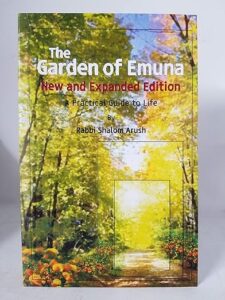
You wouldn’t have the experience. That’s that roomy quote, right? Like “the cracks are where the light gets in.” It’s honestly one of my favorite quotes. So to round it out on Maya, I feel like she’s the Hindus call her a goddess, and rightfully because it’s enabling this entire experience for your soul to learn and something. Maybe I’m too Indian, but we have too many references for academia and schools. But if the earth is a school, the fabric of the bricks and mortar is this; we can call it an illusion, but it’s quite reductionist. You’re learning quite a lot, thanks to the illusion.
Another way to frame it is that this is all consciousness. There’s nothing that’s not consciousness. There’s nothing independent of the all that is the creator. It’s like you collapse the waveform into a particle by giving it a name. But whether you call it illusion or you call it consciousness, the vibration of its source, it’s the same thing. It’s all that is structured into whatever you want to call it, a video game or a simulation, a wondrous, magical experience, a miracle; everything here is a miracle. However, you want to frame it is kind of like how you’ll experience it, but you’re collapsing the waveform into particles just by formulating words. Giving it a name, putting a name to it and speaking it out loud now brings it into physical reality when it was all infinite possibility before.
Phrase the form. Yeah.
Something I learned from reading a book recently by Rabbi Shalom Arush is that, according to Judaism, the state of being depressed or having depression is dependent on a lack of gratitude. If you are grateful for the challenges, you’re grateful for the obvious revealed blessings, then it would be impossible to feel depressed.
Would wholeheartedly agree, but I think that’s a bit of a hack. If I can say so myself, not that he’s a hack, but he’s teaching a hack for people to really like come back in because ultimately, in my worldview. Again, my worldview, it’s like the quickest way into the present moment is to find your gratitude. So depression is in the past again, and anxiety is in the future. You can anchor yourself in the present moment. Like you said before, you’ll notice the example I gave before is that I’m sitting here, I’ve got a microphone, and a camera speaking to someone in Tel Aviv, wow.
You can just feel the gratitude in that moment. Like, wow. There’s a wonder, there’s a gratitude about it. “How is this actually happening?” It somehow started off as an amoebic cell somewhere, and now this is happening. Like what is going on? If you’re filled with awe and wonder, you end up with gratitude. Gratitude brings you into the present moment. Very difficult if you continue to cultivate gratitude, continue to cultivate presence underneath that.
Sometimes, people need to give themselves space to heal their traumas, allowing them to feel more whole and present as well.
Because it doesn’t always have to be gratitude yet, sometimes it’s important for people to give themselves space to heal their traumas, so they can feel more whole and present as well. We’re multi-dimensional, we’re meant to feel all the different emotions healthily, if possible, to the best of our ability. If you can’t, then there’s a bit of work that offers itself in the shadow work there for the individual. But that’s the presence and depression in my humble opinion.
Speaking of shadow work, what have you done in that department? What kind of shadow parts of yourself did you disown or ignore, and then how did you integrate those?
Yeah, a big part of working through the six-year depression or dishonesty was a huge piece for me. It was just like working through that. One of the hardest parts was to have been dishonest with others all that time ago. But it’s another thing about how much. And for those who really dive into the shadow are actually being dishonest with themselves. That’s like you’ve chiseled something in there, and to putty that back up and to work with it, to heal it, to resonate like it’s it takes work to realize what you’ve done to yourself, why you did that, and it manifested through damaged relationships, which is so important for you.
Damaged outcomes, career paths, damaged this, damaged that, you’ve actually hurt yourself through it. Then lovingly you go back, and my favorite place to work with people generally in the shadow space, because it’s given me so much as the inner child work.
Carl Jung talks about it. Have this beautiful childlike innocence, and then the world ‘welds’ you. I’m putting words in his mouth, but the world welds you. He’s much more eloquent than this. Then you ended up all ‘welded’ out, but then at some point, especially the midlife, when you come to this point, you’ve got to reach down and bring this inner child back up to stand on the scaffolding. That was all the welding, and allow yourself to really bloom and blossom once again. But you’ve got to do that reclamation, and you’ve got to go back down into that inner child.
It takes work to realize what you’ve done to yourself, why you did that, and how it manifested through damaged relationships, which is so important for you.
There’s that saying from the Jesuits. Show me the boy or the g irl before the age of seven, and I’ll show you the man or the woman. It’s interesting to see that it’s because a lot of the time, when we’re young, the fabric of reality, many mystics will argue, is love. But when we’re young, the precursor seems to be attention. Kids are growing, like reaching for attention. I liken it to a pop plant left on a windowsill, and the attention is the mother’s or the father’s love. If the sun is coming in at a particular direction into the window, but not from other sides of the day, the plant is very strategic. It learns to grow in the direction of the light. It’s like, “There’s the sun. Imma grow that way.”
But then, as it continues to grow and grow and grow and grow, grow, now it’s starting to fall over because this part of the plant has gotten so big and it’s not serving it anymore. That whole pattern of ‘I get attention this way and the sun is here is like past its used-by date.’ It needs the opportunity to do some work to sort of go, “Can I straighten myself out?” But it’s like, “No, but I can’t because I believe this is where I get.” You don’t need to; you can draw from the soil. You can draw from the soil. There’s plenty of water. There’s actually sunlight all around. You don’t need to draw attention from that same place anymore, but it has this feeling of “I must, kinda, I got it.”
We get held in these patterns past their ‘use-by date.’ So going in and looking at the child that contorted itself to get the love and the attention in touch with it was seeking through that period, holding it lovingly. That’s the hardest thing because we keep pushing our, “I’m not good at this, or I’m not good at that, or I don’t do this.” We just end up shooting more onto ourselves and compressing more of those things into that space. And it’s not for the lighthearted. But to come back in and emerge from there and sort of say, “Okay, what is it that you need?” We just end up shooting more into ourselves and compressing more of those things into that space.
It’s not for the light-hearted, but to come back in and emerge from there and sort of say, “Okay, what is it that you really wish you had gotten?” I was like, “My father didn’t have the time, or my mother didn’t have the time, or my mother was being whatever’s in there.” And then loving that party yourself. Lovingly pulling that plant until it’s all good. You don’t need that anymore. With love, it is quite a deep place to go into and to start to do the work over time. It’s not something that happens overnight. You’ve to build that relationship with your inner self.
And life’s busy. I’ve done this work with so many people. Your day-to-day stuff gets in the way, and like venturing into yourself. It’s the reason why you’ve locked it away, and it’s uncomfortable. You don’t look at it, you don’t go there. You’ve got to turn a practice of it, you know, to go in there. But you give it two months, you give it three months.
You have to be aware that it even exists because if you’re not, then you’re just flying blind.
“Have a beautiful childlike innocence, so the world ‘welds’ you.”
Then it starts to shift. You see people before and after, and you can see it like the creases in their faces change. It’s remarkable. They carry themselves differently. There are a lot of modalities. And one of the things I will just reference to shadow workers again, because it is echoing sentiments we’ve shared in this podcast already.
One of the things I’m certified in is Gene Keys guiding coach, and Gene Keys have been doing that for about seven or eight years now. They have each key in your hologenetic profile, which may mean something to some people, but not to others. Each key that makes up you has three, has a shadow as a gift and has a siddhi. A siddhi is a Hindi word for a Sanskrit word meaning enlightened, beneficial quality, right?
Then there’s a gift and there’s a shadow. One of the teachings from the Gene Keys is consistently that your shadow is an opportunity to rise up into the gift of like, don’t avoid it. The more you avoid it, the more the shadow keeps rearing its head. Like, “Hey, you’ve got some gifts here.” Back to the crack is the light where the light gets in. It’s like, “Can you learn to like, or even embrace it?” And you don’t have to dwell in it.
Using that to understand, “Oh, right, one of my shadows is in conflict.” But that means actually I’m really good at diplomacy. I’m really good at diplomacy, and the city is united. It drives me. I want to unify everything, but what I see everywhere is like conflict, conflict, conflict. That’s really painful. It’s like, diplomatically, let’s come into the gifts. What can we do to diplomatically iron some of this out? So there can be more unity. So the shadow is in fact an opportunity.
That’s great. I read Debbie Ford’s book. The Dark Side of the Light Chasers. Really profound book.
Oh, interesting title. Yeah, I’d love to hear it.
Great book. It’s a foundational book on shadow work. There are some exercises after each chapter. And if you actually do them, it’s quite profound. You get a lot of benefit in integrating and in healing that part of you that you’ve disowned.
I’m going to get a copy. Yeah, this sounds really up my alley.
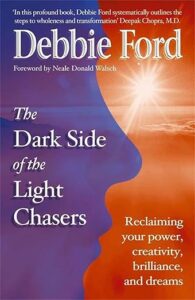
Another thing that you said earlier that I want to circle back on is that you were talking about the word should. Don’t ‘should’ on yourself or something like that. That reminded me of something I learned from the modality NVC, nonviolent communication developed by Marshall Rosenberg. And that is ‘should’ is the most violent word in the English language.
It’s such a gospel book. I absolutely adore that work. Yeah, it is. The work that I do is all about meta flow, and it’s the flow that you experience when you’re in alignment with your values. If my story has taught me anything, it’s that life is in alignment with your values in inspired evolution and out of alignment. Now with this astrological and life in alignment with your astrological makeup, and the reason you put here.
The violence you commit against yourself when you’re living out of alignment, thinking that you need to hustle your way through because society’s told you that you should live this way. It’s suppressing your soul, the dreams, the brilliance, the creativity, everything you will put here to do. That’s your power. Then the opportunity to realign, to come back, to reclaim your power, reclaim your creativity, reclaim your brilliance, reclaim your dreams.
That’s when you’re in flow, because you’ve put your life in alignment with what it is that you’re putting it to do. And life opens up as flow. People are trying to hack and optimize flow states based on dopamine receptors, serotonin receptors, norepinephrine and all this, which is great. You can in the moment, but there are also these things, and people have these synchronicities open up from where?
When you’re on your path, it’s a sign you’re on the right path. Intuition is more alive. Certain gifts come online. It’s like, “Wow, how was I, of all people, given the opportunity to be coached by Eckhart Tolle for six months?” I’m like, “What is going on?” But at the time, that’s what I needed that to be like, “Oh my God, this is such a gift that I’m on the right path. How does this even happen?” I’m like, “Okay, I must be on the right path. Shut up, close your mouth, keep going, and those are those.” When you’re in flow with your life, and the reason you’ll put here to like, that’s that metaflow.
So I know you have a free course on discovering your soul’s blueprint. What would be a wisdom nugget from that course that would help our listener?
We can dive in there. Basically, it brings you into the first place, where we start with the values. The next place we take you through is your strengths, the strengths that you’ve accumulated through this lifetime. Then, we help you build out a vision. The way we build out a vision is quite bespoke to us. So it’s a bunch of fun. That’s the general arc. What’s underpinning there is when we talk about metaflow. It’s all about living a life in alignment with your highest purpose.
The violence you commit against yourself when you’re living out of alignment is thinking you need to hustle your way through because society’s told you that you should live this way. It’s suppressing your soul, dreams, brilliance, creativity, and everything you will put here to do.
Deepest souls calling. If you bear with me just a few moments, I’ll just unpack it for you, the metaflow formula. So you don’t have to read the book, which you can, but you start off by understanding your values. If you can understand your values, that underpins what we call in this three-part framework, your curiosity. Back to what I said initially, you are the universe looking in on itself.
That much mysticism, everybody seems to be able to get on board with. I’m the universe having an experience of the universe folded in on itself. Stephan over there, Amrit over here. What is going on? You can’t deduce much about the nature of the universe from that. But it’s curious about itself. It’s looking in on itself, is it not? Like that’s at least something I feel like is ephemeral, and it’s actually quite conclusive.
Curiosity is actually sacred. It’s something that is fundamental to the fabric of this consciousness experience that we’ve been talking about a little bit. To understand that and back to your point, ‘shoulding’, there are sacred curiosities and then what I call ‘hijacked curiosities’. Where our curiosities get hijacked, show me the boy or the girl before the age of seven. I’ll show you the man or the woman. We get told we need a career. We need this. We need that. You need a Mercedes. You need this. You need that. Whatever, whatever, whatever, whatever.
All that ‘shoulding’, that most violent thing you can do to your point. Sorry for pointing at you, but to your point, it’s such a great point. We get ‘hijacked’. Curiosities. So how do we understand whether the curiosity, cause it’s very difficult to tell from the level of curiosity. Am I living my own curiosities, or am I living other people’s, like ‘hijacked curiosity ’? How do you tell? Underpinning that are your core values, and you understand your values. That’s the first part, which takes you through understanding your core values.
For me, I’m connecting, contributing, and celebrating. Back in engineering, was I connecting? No. Was I contributing a little bit? Was it aligned with the contribution I wanted to make? No. Celebration? There was very little celebration. Coach, speaker, podcaster. Do I get to connect with people? Yes. Contribution? I’m hoping there’s a good contribution through this and its alignment and celebration. Hopefully, everybody leaves this podcast celebrating their life a little bit more. So I’m in alignment with my values.
Then I can check back in and be like, “Okay, what I’m curious about is whether it was built upon my values?” And it’s like, “Yes, it is great. You’re now aligned.” That’s why we build the vision in alignment. The first thing we do is get clear on your value. We can easily help you build your vision, but without that fundamental thing, and then looking at the strengths that you’ve accumulated through your lifetime, through the tribulations, through the highs, again, this is like hacking your astrology to have a look at like, what were the key points at which you achieved really great things and really struggle with certain things. You’ve developed some real masterful strokes in there.
We build your vision. From there, that’s the Discover Your Soul’s Blueprint Course, curiosity. But the metaflow formula then goes, you’ve got your sacred curiosity, and it becomes incumbent upon you to understand the delta between curiosity and passion. The next step is passion. In order to get from curiosity to passion, the bridge is cultivation, so if you can find three or more, ideally five or more curiosity points.
Like, I’m curious about spirituality, personal development, the impact that media can have on people positively, good news media, human connections, in-person experience, hugs, like this is a bunch of curiosity points for me. If I can draw a ring around five or more, naturally, these start to ping off each other, and energy is generated. If I can cultivate that, I fill up what I call my ‘cup of passion’. This is what I say, this is what I think when people say, “Fill up your cup, what are they referring to?”
This is what they’re referring to. Obviously, I’m biased because it’s my formula. I’m sitting here, touchwood, and not my formula anyway. But do you know what I mean? Like this is your ‘cup of passion’. You need to cultivate your curiosity bit by bit. I didn’t start off with a podcast. It started with a gathering in my house. Every two weeks, people would come over and shoot the shit on spirituality and philosophy. We’d nerd out on Jungian archetypes, all sorts of cool stuff. That then grew from them going, “You need to start a podcast.” And I was like, “No, no, no, no.” But I was cultivating things I was curious about organically that were built upon my core values, and it was my sacred curiosity, and that started to fill the cup up. So I was cultivating it. Every two weeks, people would come over, tick tock, tick tock. And then what ended up happening from an overflowing cup of passion, people were like, You need to send this further.
Take your time, don’t rush to cultivate, allow the cup to fill up, and from an ‘overflowing cup’, you get the opportunity to live your purpose.
Can you please take the time? Don’t rush to cultivate. Take the time, allow the cup to fill up, and from an ‘overflowing cup’, you get the opportunity to live your purpose. Now the trick is that your passion is for you. Your purpose is for the world, but they’re the same thing; but don’t rush. Make sure you’ve cultivated enough of your passion because it will get stress-tested and checked out in that way. Sometimes you think you’re doing something, but actually it’s another thing, but it’s in alignment, but it’s a slightly 5 % difference. So take the time to cultivate and fill the cup.
And then from an ‘overflowing cup‘, like I started a podcast and someone said, “Hey, will you coach me?” “On what?” Just have the conversations you’re having. I was like, “Really? There’s value in that.” “Yeah, there is.” And that set me on my trajectory. I’ve gone, and now they’re like certified in 21 different things. Now I’m a Vedic astrologer too. I’m like, “What is going on with my life?” But the engineer in me looks at me and goes, “You what?” Which you know what I mean?
That becomes your purpose. You’d learn. The bridge between passion and purpose is service. That’s why the book mentions those houses; the metaflow is called serve your purpose. Cause that’s the end step is to serve your purpose. Touchwood, and the reason that you’re here. That’s the metaflow concept, through them.
I know we’re getting close to the end here, and I’m curious to hear your kind of secret to getting some of the biggest guests in spirituality on your show because your guest list reads like a who’s who. Like all the big authors and all the experts, and how did you pull that off? Obviously, with an ‘overflowing cup,’ you’ve got the passion and the desire to bring it about, but how did you manifest that into the physical?
Are you ready for it? It’s a great question. I really appreciate you. And I’m glad that we just spoke about the entire metaflow formula, so you guys can really understand. So this is Nat. For those that aren’t watching the video, I’m pointing to a picture I’ve got in my podcast studio of my first-ever yoga teacher, and I love her dearly. She’s like an auntie to my children. She’s super tight, and she was the first ever guest on the Inspired Evolution podcast.
Like I said, the Inspired Evolution podcast was birthed out of my living room every two weeks. I was having these people come over. We were discussing really cool things, and they told me I should start a podcast. I just thought the people in my local community were the coolest people. It started with that. I was interviewing my yoga teacher. And then from there, I interviewed another friend of mine who is now an entrepreneur disruptor. Now he’s worth like $40 million, but that’s beside the point.
But I was starting to interview all authors, people who were really interesting in my local grounded network. I remember the first big guest, if you want to call it that, outside of my network that I got on was Dr. John Demartini. It meant so much to me. But even that was like 12 months after I interviewed people that were just in my, it was very grassroots. Literally started in my living room with me. The first time I opened up my living room, I opened it up to you. I invited 25 different people. One person showed, the next time two people showed, I wasn’t under any pressure for them to have to come. But it’s been very grassroots the whole way through. The whole way through. When people ask me, what was it like sitting opposite Marianne Williamson? You must’ve been really terrified of going into a conversation with someone like a spiritual heavyweight. I reflected on it, like, no, it was really an aura at the moment, but I wasn’t actually that intimidated. And then like, huh? I have to reflect on it further. It’s actually because the Miriam Williamson podcast episode happens like four years into the podcast.
At which point I’ve been interviewing a guest every single week without fail consistently, for four years prior to that. Now, Mary Ann is here, another guest. So in a couple of words, don’t quit is probably not what people want to hear is don’t quit. Just start, start with around you, and I’m still, and this is back to the imposter syndrome, sometimes I look at my phone and like go through it. It was like this person you’ve idolized for a lot of your life, and is in your phone directory. Like what is going on here? It’s really trippy. But again, back to metaflow, when you’re in alignment with doing the work you meant to do, things open up touchwood, like you’re not touchwood. It’s just what is going on.
You who blow yourself away, opportunities, things open up, you would surprise yourself. But it’s because of what you were meant to hear to do. One of my mentors, Vishen Lakhiani from Mindvalley, says it’s like the hand of God. Once you’re oriented, he moves obstacles out of your way for you because he knows you’re listening to think about the work that you’re put here to do. And I really love the way he articulates.
Well, it’s a great way to end the episode. So if our listener or viewer wants to learn more from you, work with you, or subscribe to your podcast. Where should we send them?
Absolutely. If you guys want to dive in deeper, the podcast is a great place. So please listen to the Inspired Evolution podcast on YouTube. It’s under my own name, Amrit Sandhu. You can find us there, but it is the Inspired Evolution podcast. The podcast has been growing, and the conversations around the podcast have been growing. We recently launched a community where people can connect to the podcast as well. The guests that you described come on once a month, and I step out of the way, and the audience asks their questions directly to the guests. It’s like a really cool experience just to sort of see what the audience asks directly of the guests as well. Once a week in that community, we guide meditations and we do community sharings, and people are coming in doing breath work. There’s some Reiki, all sorts of cool stuff happening in that community. We’ve just launched the circle. It’s been a really beautiful experience, and that’s inspiredevolution.com/circle. But yeah, you’ve listened to this podcast this far. I’m hoping it’s inspired you to know more about yourself and your values.
Got a 20-minute masterclass as Stephan pointed out before, as part of the Discover Your Soul’s blueprint package. inspiredevolution.com/values, you can know your values. Keep listening to me for another 20 minutes. You will actually have something really practical and tangible to take away from this podcast. You’ll know yourself that much better, and you’d be able to make decisions, life decisions, partnership issues, start to like I’m this person and you’re that person. We’re not meant to agree. Good job. I’m comfortable now.
It just heals in so many different ways. I think those are really three great resources or places to start. I am a coach. I do help people. But yeah, start there and then let the journey, let the journey begin.
All right, Amrit, thank you so much. Of course, thank you also, listener. Go out there and make the world a better place. We’ll catch you on the next episode. I’m your host, Stephan Spencer. Signing off.
Important Links
Connect with Amrit Sandhu
Articles
Books
Businesses/Organizations
People
Film
Previous Get Yourself Optimized Episodes
YouTube Videos


